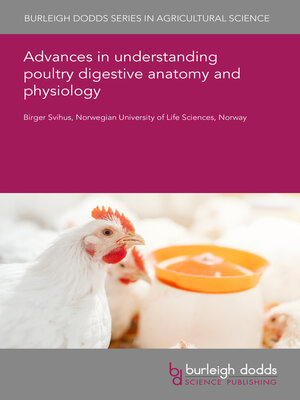Advances in understanding poultry digestive anatomy and physiology
ebook ∣ Burleigh Dodds Series in Agricultural Science
By Professor Birger Svihus

Sign up to save your library
With an OverDrive account, you can save your favorite libraries for at-a-glance information about availability. Find out more about OverDrive accounts.
Find this title in Libby, the library reading app by OverDrive.



Search for a digital library with this title
Title found at these libraries:
| Library Name | Distance |
|---|---|
| Loading... |
A well-functioning digestive tract is key to a sustainable poultry production. Significant progress in our understanding of the digestive tract functionality has allowed for further improvements, and will continue to do so. Feed intake is a prerequisite for a high performance, where feed particle size is a key element. Although crop retention would potentially improve the digestion process, the practice of ad libitum feeding does not fully stimulate to its maximal use. The gizzard plays a very important role due to its very effective fine grinding and its role as a feed-flow regulator, but structural components need to be included in the diet. As material passes into the relatively short small intestine, it is remarkably quickly digested and absorbed. Fermentation in the caeca may contribute to some energy for the bird, but its major role seems to be water reabsorption, including from urine being refluxed into the caeca from the cloaca.







